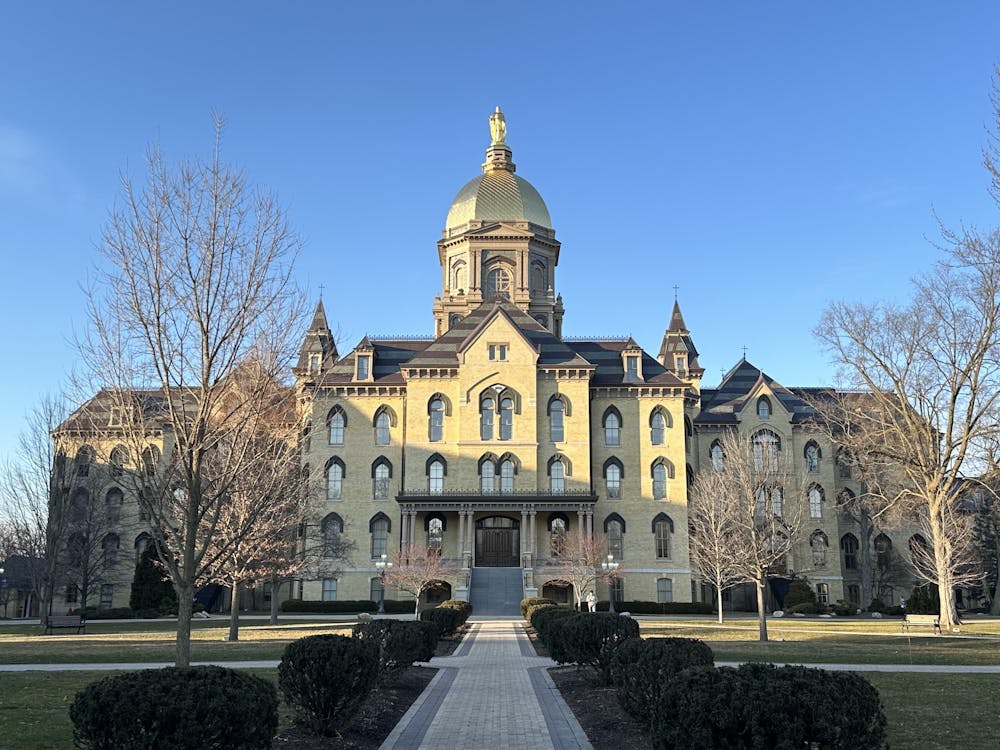Last Wednesday, the Notre Dame student senate passed Resolution SS 2324-10 urging the University to consider including the protection of individuals on the basis of sexual orientation in Notre Dame’s non-discrimination clause.
The resolution was sponsored by Sorin Hall senator and sophomore Andrew Ryan, who cited similar resolutions passed in 2012, 2008 and 1998 as his motivation for reaffirming that this is an issue that is still important to students.
“I was looking back at previous stuff the senate had done … And one of my main points was to show that this is still important to people,” Ryan said. “I tried to build an argument that even if the administration hasn’t done anything [before], it’s an important symbol to include sexual orientation in the non-discrimination clause.”
Ryan cited the 2022 inclusive campus survey as a major reason for advancing this resolution. According to the survey, 48% of LGBQ men and 35% of LGBQ women reported experiencing adverse treatment due to their sexual orientation, while 1% of straight men and 0% of straight women reported experiencing the same.
“People still feel that they are not accepted for who they are. I understand the Catholic sentiment of the issue and I think that’s obviously why it hasn’t been acted on,” Ryan said.
“The University has made strides in terms of sexual orientation. There’s PrismND, there's Gender Relations, we have a lot of resources, so clearly it’s not something we are afraid to tackle,” Ryan said. “The final step is to make it legally binding in writing.”
Greg Gehring, director of gender relations and LGBTQ+ Advocacy was unavailable to comment on this story.
The resolution also cited other universities that are part of the Congregation of Holy Cross, including Kings’ College and Stonehill College, that include protection on the basis of sexual orientation in their non-discrimination clauses.
The last time a resolution like this was discussed in the student senate was in 2012. Ryan said, in 2012 the administration responded to the resolution by explicitly saying ‘We are not changing it.’
“I think anything trying to change here takes time. I’m not expecting anything to happen tomorrow, it’s not something that can happen overnight, but I think the fact that this is a substantive issue, the specific non-discrimination clause, it elicits a response from the administration either way,” Ryan said.
Last school year, junior Pablo Oropeza, former vice president of Stanford Hall, and senior Dane Sherman launched an initiative under Irish for Inclusion to change the University’s non-discrimination clause to include sexual orientation, gender identity and religious affiliation. This initiative is different from the resolution passed in the senate last week. The senate resolution only includes sexual orientation in its proposed changes, not gender identity and religious affiliation.
Oropeza said he started the initiative after having students come to him and tell him how they were suffering at the University. He said he knew he had to do something.
“Everyone should have a place here. Notre Dame is home to thousands of people. No matter who you are or where you come from, I believe that we’re all made in the image and likeness of God and we shouldn’t be discriminatory towards anybody,” Oropeza said.
Last year, Oropeza and Sherman visited hall councils and club meetings to collect signatures for the petition in hopes of garnering 15 percent of the student body’s support, get a referendum voted on and get the proposed amendment sent to the administration for a decision.
Oropeza said they got 1,500 signatures on the petition and sent an open letter to Rev. Gerard Olinger, the vice president for student affairs, in December 2022. Their letter resulted in a non-response from Olinger and no conversations were held with administrators.
Oropeza is hesitant that this new resolution in the senate will elicit a different response from the administration.
“I don’t know how much credence they will give the resolution, but I hope it proves to the administration that people are still fighting for this, people still want this to happen, especially in the senate, where they have student body support,” he said.
In terms of the future of the resolution, Ryan said he plans to talk with the senate advisor about how to move forward and what the next steps are administration-wise. Ryan also serves on the Campus Life Council and any resolutions passed there require a response from the vice president of the university, so he suggested presenting this resolution from the senate at an upcoming meeting of the Campus Life Council.
He also mentioned bringing the resolution to the faculty senate to see if they would be interested in endorsing the resolution.
“There’s a lot of relevance, in terms of hiring, and there’s concerns for faculty in terms of coming here and being treated differently, so I think introducing it in the faculty senate would be useful.”










